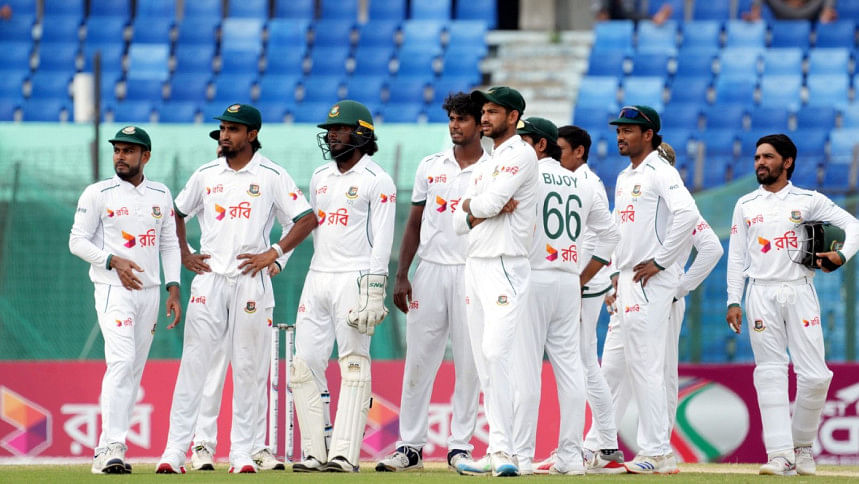Tigers revert to old ways against Zimbabwe: A worrying sign?

"Why did we have to backtrack in terms of our planning against a team like Zimbabwe?" asked former Bangladesh captain Habibul Bashar, despite the home side's massive innings and 106-run victory in the second Test in Chattogram.
When a team wraps up their opponents within three days of a five-day game, what could be more satisfying than that?
And if that win came after a shock defeat in the first match, it should feel even sweeter.
The win also ended Bangladesh's six-match losing streak at home. They had lost to New Zealand, Sri Lanka, and South Africa before slumping to a three-wicket loss to Zimbabwe in Sylhet last week.
So, the dominant win at Chattogram brought welcome relief to the Tigers' tent, salvaging pride and levelling the series 1-1.
But while the result salvaged pride, did it really signal a step forward in Bangladesh's journey to becoming a solid Test side? The question persists—especially considering the way the team bounced back using a formula that once again relied heavily on spin.
"Honestly speaking, I hope that first Test was a one-off in terms of planning. Because I fear we're actually going backwards with this win," Bashar admitted, despite the overwhelming nature of the victory.
"Brilliant performance. The whole team did a great job. We didn't play good cricket in the first Test, but we knew we could play good cricket here because we've done it before," said Bangladesh captain Najmul Hossain Shanto during the post-match presentation.
Indeed, there's no denying that Shanto's side executed their plan flawlessly in Chattogram—something they've done plenty of times before on similar pitches.
Spin dominated as expected. Bangladesh dismissed Zimbabwe twice in three days, with only one wicket falling to a pacer—debutant Tanzim Sakib in the first innings. The three main spinners—Taijul Islam (9 wickets, including a five-for), Mehedi Hasan Miraz (5), and Nayeem Hasan (3)—accounted for 17 wickets. The remaining two dismissals were run-outs.
But that raises a deeper question: was it wise to revert to a tried-and-tested formula against a low-ranked side just to level a series?
"I'm not denying that a Test win is important," Bashar continued, "but when you talk about moving forward with a long-term plan, this is concerning. I wouldn't mind using the old tricks to win against teams like England or Australia. But to fall back on spin just after one defeat on a sporting wicket—did the think-tank press the panic button? I'm not sure. But it's unfortunate."
"If we can't stick to our planning even against lower-ranked sides, how can we expect growth in Test cricket? I'm not against offering spin-friendly conditions, but why against Zimbabwe? Why did we lose confidence after one loss?"
"You have to keep faith in sporting wickets if you want to develop both your batters and pacers to compete against top sides. Our pace bowlers are shaping up well, but we didn't back them after just one failure," Bashar lamented.
"I don't know if people have forgotten how Mirpur came alive with a pace onslaught against Afghanistan," he reminded.
Indeed, the pace trio of Ebadot Hossain, Shoriful Islam, and Taskin Ahmed had shared 14 of Afghanistan's 19 wickets during Bangladesh's massive 546-run win in the one-off Test last June.
That contrast, Bashar feels, reflects the inconsistent mindset that continues to hinder Bangladesh's Test progress. Despite notable wins abroad—like the historic Mount Maunganui Test win over New Zealand in 2022, and previous successes in Pakistan and the West Indies—Bangladesh haven't been able to build on them with consistency.
So, while the win may have quieted immediate criticism, Bangladesh's tendency to fall back on old habits could just be inviting more of it in the future.

 For all latest news, follow The Daily Star's Google News channel.
For all latest news, follow The Daily Star's Google News channel. 








Comments